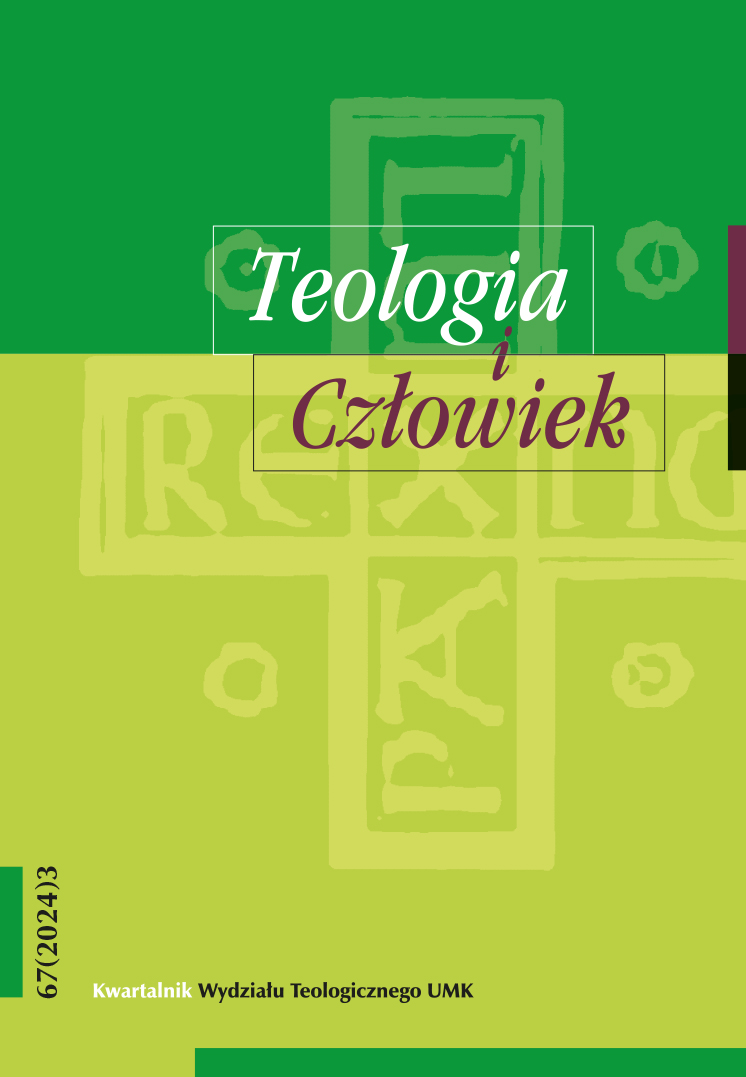Problem Trzech Miast
O warunkach dialogu między wiarą, nauką i techniką
DOI:
https://doi.org/10.12775/TiCz.2024.020Słowa kluczowe
teologia, nauka, technika, Dolina Krzemowa, wyjaśnienia ostateczne, ewolucja, Stwórca, ateizmAbstrakt
Do Tertuliańskiej diady Aten i Jerozolimy, która symbolicznie określa relację wiary i rozumu, a tym samym teologii i nauki, należy współcześnie dodać jeszcze trzecie „Miasto”: Dolinę Krzemową. Oznacza ona nowy typ związku nauki, techniki i obrazu świata, który z jednej strony stanowi istotne wezwanie dla refleksji filozoficznej i teologicznej, z drugiej zaś wykazuje tendencje do formułowania tez filozoficzno-teologicznych. Celem niniejszego artykułu jest analiza wybranych przeszkód w owocnym dialogu trzech „Miast”, który jest nie tylko możliwy, ale także niezbędny. Zakłada on przede wszystkim przestrzeganie granic metodologicznych, bez czego niemożliwe jest ustalenie punktów stycznych między tymi trzema spojrzeniami na rzeczywistość. Dialog wymaga otwarcia i wzięcia pod uwagę nie tylko najnowszych wiedzy naukowej i dociekań filozofii, ale także współczesnych koncepcji teologicznych, szczególnie tych dotyczących Stwórcy i stworzenia świata. W ponad trzydzieści lat od ogłoszenia encykliki Jana Pawła II Fides et ratio o wzajemnej relacji wiary i rozumu warto ponownie postawić pytanie o warunki dialogu Jerozolimy, Aten i Doliny Krzemowej.
Bibliografia
Burgis, Luke. “The Three-City Problem of Modern Life. What does Athens have to do with Jerusalem—and what do either have to do with Silicon Valley?” Ideas 28 (2022), https://www.wired.com/story/technology-philosophy-three-city-problem/ (dostęp: 25.10.2022).
Drummond, Henry. The ascent of man. New York: James Pott & Co, 1898.
Franciszek. Address to participants in the 2024 Lemaître Conference of the Vatican Observatory (20.06.2024). https://www.vatican.va/content/francesco/en/speeches/2024/june/documents/20240620-specola-vaticana.html (dostęp: 5.07.2024).
Gomółka, Jakub. „Semantyka Anzelmiańskiego imienia Boga.” Kwartalnik Filozoficzny 40, z. 3 (2012): 5–22.
Harari, Yuval Noah. 21 Lessons for the 21st Century. London: Vintage, 2019.
Harari, Yuval Noah. Homo Deus. A Brief History of Tomorrow. London: Vintage, 2017.
Hawking, Stephen, and Leonard Mlodinow. Wielki projekt, tłum. Jarosław Włodarczyk. Warszawa: Albatros, 2011.
Heller, Michał. Bóg i nauka. Moje dwie drogi do jednego celu, tłum. Ewa Nicewicz-Staszowska. Kraków: Copernicus Center Press, 2013.
Heller, Michał. Nauka i teologia – niekoniecznie tylko na jednej planecie. Kraków: Copernicus Center Press, 2019.
Heller, Michał. Nowa fizyka i nowa teologia. Kraków: Copernicus Center Press, 42014.
Heller, Michał. Ostateczne wyjaśnienie wszechświata. Kraków: Universitas, 2008.
Jan Paweł II. „Posłanie Jego Świątobliwości Ojca Świętego Jana Pawła II do Ojca George’a V. Coyne’a dyrektora Obserwatorium Watykańskiego.” Zagadnienia Filozoficzne w Nauce 12 (1990): 2–12.
Jan Paweł II. Encyklika Fides et ratio. Wrocław: Wydawnictwo TUM, 1998.
Karłowicz, Dariusz. Sokrates i inni święci. O postawie starożytnych chrześcijan wobec rozumu i filozofii. Warszawa: Teologia Polityczna, 2020.
Kojonen, Erkki V. R. “The God of the Gaps, Natural Theology, and Intelligent Design.” Journal of Analytic Theology 4 (2016): 291–316. DOI: https://doi.org/10.12978/jat.2016-4.041708101413a.
Komorowski, Marcin. „Pojęcie teologii w pismach Platona i Arystotelesa.” Acta Universitatis Lodziensis. Folia Philosophica 26 (2013): 3–26. DOI: https://doi.org/10.18778/0208-6107.26.01.
Pabjan, Tadeusz. Anatomia konfliktu. Między nowym ateizmem a teologią nauki. Kraków: Copernicus Center Press, 2016.
Peterson, Gregory R. “What does Silicon Valley have to do with Jerusalem?” Zygon 39, nr 3 (2004): 541–554. DOI: https://doi.org/10.1111/j.1467-9744.2004.t01-1-00600.x
Peterson, Gregory R. Minding God. Theology and the cognitive sciences. Minneapolis: Fortress Press, 2003.
Platon. Państwo. Kęty: Wyd. Marek Derewiecki, 2020.
Ratzinger, Joseph. „Prawdziwa religia?” W Joseph Ratzinger Opera Omnia, t. III/1, 372–387. Lublin: Wydawnictwo KUL, 2021.
Ratzinger, Joseph. „Rozważania na temat wiary, religii i kultury.” W Joseph Ratzinger Opera Omnia, t. III/1, 305–327. Lublin: Wydawnictwo KUL, 2021.
Tertulian Kwintus Septymiusz Florens. De praescriptione haereticorum – Vom prinzipiellen Einspruch gegen die Häretiker (lateinisch-deutsch), tłum. na niem. D. Schleyer (Fontes Christiani, t. 42). Turnhout: Brepols, 2002.
Pobrania
Opublikowane
Jak cytować
Numer
Dział
Licencja
Prawa autorskie (c) 2024 Marian Szczepan Machinek

Utwór dostępny jest na licencji Creative Commons Uznanie autorstwa – Bez utworów zależnych 4.0 Międzynarodowe.
CC BY ND 4.0. Posiadaczem prawa autorskiego (Licencjodawcą) jest Autor, który na mocy umowy licencyjnej udziela nieodpłatnie prawa do eksploatacji dzieła na polach wskazanych w umowie.
- Licencjodawca udziela Licencjobiorcy licencji niewyłącznej na korzystanie z Utworu/przedmiotu prawa pokrewnego w następujących polach eksploatacji: a) utrwalanie Utworu/przedmiotu prawa pokrewnego; b) reprodukowanie (zwielokrotnienie) Utworu/przedmiotu prawa pokrewnego drukiem i techniką cyfrową (e-book, audiobook); c) wprowadzania do obrotu egzemplarzy zwielokrotnionego Utworu/przedmiotu prawa pokrewnego; d) wprowadzenie Utworu/przedmiotu prawa pokrewnego do pamięci komputera; e) rozpowszechnianie utworu w wersji elektronicznej w formule open access na licencji Creative Commons (CC BY-ND 3.0) poprzez platformę cyfrową Wydawnictwa Naukowego UMK oraz repozytorium UMK.
- Korzystanie przez Licencjobiorcę z utrwalonego Utworu ww. polach nie jest ograniczone czasowo ilościowo i terytorialnie.
- Licencjodawca udziela Licencjobiorcy licencji do Utworu/przedmiotu prawa pokrewnego nieodpłatnie na czas nieokreślony
PEŁEN TEKST UMOWY LICENCYJNEJ >>
Statystyki
Liczba wyświetleń i pobrań: 194
Liczba cytowań: 0



